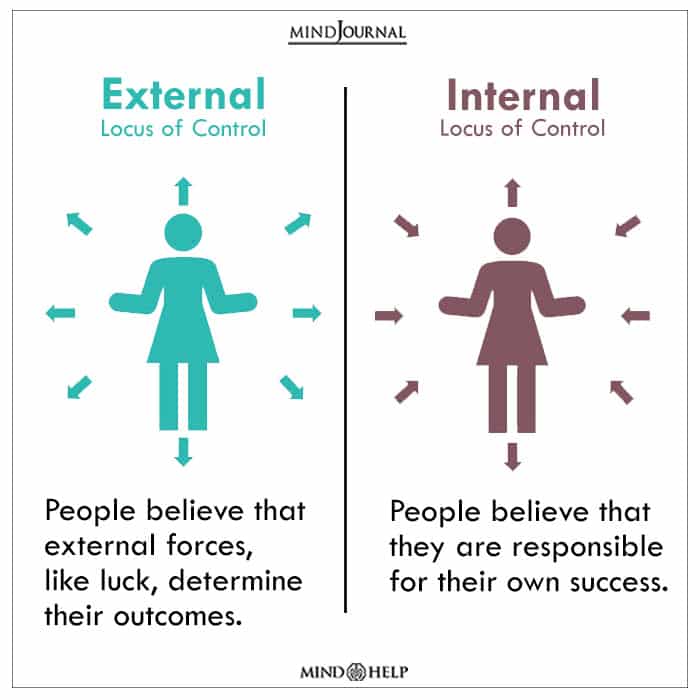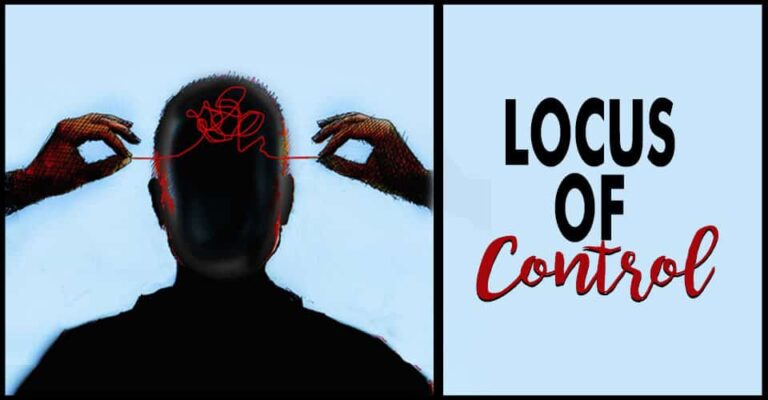Locus of control (LOC) refers to an individual’s belief system regarding how much control they have over the events that influence their lives.
What Is Locus Of Control?
In psychology, locus of control is defined as the strength of a person’s beliefs regarding the extent of control they have over events and experiences that have an impact on their lives. It is the belief that is associated with how much control we have over the situations we encounter in everyday life. LOC is the extent to which we believe that whether our life is controlled by ourselves or by external factors.
American psychologist Julian B. Rotter developed the psychological concept in 1954. Furthermore, psychologist Philip Zimbardo explained this concept in his book Psychology and Life in 1985. He defined this concept as “a belief about whether the outcomes of our actions are contingent on what we do (internal control orientation) or on events outside our personal control (external control orientation)”.
In case a difficult situation arises, do you feel that you have ultimate control over the consequences? Or do you attribute it to external factors? On the basis of the answers, your area of focus may be distinguished between the internal and external locus of control. A person’s “locus” is conceptualized as internal or external. If you are someone who attributes their successes and failures to themselves then you are focused on your internal locus. If you believe that your successes and failures are due to external forces then you are focused on your external locus. This phenomenon is viewed as an inborn personality trait.
Internal Locus Of Control
Individuals who have a strong internal locus of control tend to believe that life events are primarily a result of their own actions. For instance, in the case of receiving exam results, people with an internal locus of control tend to attribute praise or blame to themselves or their abilities. If someone believes that they are the creator of their own destiny, they are more likely to take charge of the situation.
They are more internally focused rather than blaming it on external factors. Studies 1 Miller, J. (2005, August). THE IMPACT OF LOCUS OF CONTROL ON NIINORITY STUDENTS. CORE – Aggregating the world’s open access research papers. https://core.ac.uk/download/pdf/5066745.pdf have shown that children who were raised by parents, who encouraged their independence and helped them to learn the connection between actions and their consequences, were found to have a more well-developed internal locus of control.
External Locus Of Control
External locus of control is when a person believes that they do not possess any control over life events that are either positive or negative. People with external locus tend to praise or blame external factors. For instance, if a student did not perform well in their exam, they will immediately blame external events such as the teacher or the questionnaire for their below-average performance.
When someone blames negative outcomes on external factors, they are less likely to work towards change or do the needful. Hence they are more externally focused. There is evidence 2 Nowicki, S., Gregory, S., Iles-Caven, Y., Ellis, G., & Golding, J. (2018). Early Home-Life Antecedents of Children’s Locus of Control. Frontiers in psychology, 9, 2032. https://doi.org/10.3389/fpsyg.2018.02032 that suggests it is often shaped by childhood experiences, including children’s interactions with their parents.
Internal Vs. External LOC

Most people resort to a combination of internal and external factors. There are certain characteristics of people that are governed by a dominant internal or external locus of control. The characteristics of people influenced by Internal vs External locus are as follows:
| Internal Locus of Control | External Locus of Control |
| Takes responsibility for their own actions | Places blame on external forces |
| Less influenced by the opinions of others | Tends to credit luck or chance for any successes |
| Does well in tasks when they work on their own pace | Refuses to believe that their situation can change through their own efforts |
| Physically healthier | Feels helpless or powerless in different situations |
| Works hard to achieve the things they want | More susceptible to experiencing learned hopelessness |
| Has a strong sense of self-efficacy | Physically unfit |
| Are more happier and independent | Doesn’t work towards success or change |
| Achieves greater success at workplace | Less happier and dependent |
Measuring Scale For Locus Of Control
In 1966, Julian B. Rotter developed the forced-choice scale, the most widely used questionnaire used to measure the internal and external factors that individuals are governed by. The Rotter scale requires respondents to choose between two alternatives and two possibilities for each item. This helps to understand how a person responds to certain events that occur in their life. It also depends on the individual’s motivation to take action for or against those events.
Rotter pointed out that our behavior is usually governed by rewards and punishments and that it was these consequences that molded our belief systems. Our beliefs about the cause of our actions influence our behaviors and attitudes.
Do You Have An Internal Or External Locus Of Control?
Here’s how you can find out whether you resort to internal or external factors when life presents its challenges:
Perspective 1:
- I feel that I have zero control over my life and what happens to me
- There is no point in setting goals or making plans because there are too many things that are not in my control
- People don’t usually get what they deserve
- Life is only based on chances or luck
- I have very little influence over the world
In case you resonate with the statements mentioned above, then you probably tend to have an external locus of control.
Perspective 2:
- If I work hard and commit to my goals, I can achieve what I desire
- I don’t believe in fate or destiny
- If I study hard and be well prepared, I can do exceptionally well in my exams
- Success is dependent on hard work and dedication; it has nothing to do with luck
- People get what they deserve in the long run
In case you resonate with the statements mentioned above, then you have an internal locus of control.
Influence Of Locus Of Control In Your Life
People with an internal control orientation can also be referred to synonymously as self-determined individuals. Research 3 Sherman, A. C., Higgs, G. E., & Williams, R. L. (1997). Gender differences in the locus of control construct. Psychology & Health, 12(2), 239-248. https://doi.org/10.1080/08870449708407402 suggests that men have a higher internal locus of control than women. A 2019 study 4 Hovenkamp-Hermelink, J. H., Jeronimus, B. F., Van der Veen, D. C., Spinhoven, P., Penninx, B. W., Schoevers, R. A., & Riese, H. (2019). Differential associations of locus of control with anxiety, depression and life-events: A five-wave, nine-year study to test stability and change. Journal of Affective Disorders, 253, 26-34. https://doi.org/10.1016/j.jad.2019.04.005 also showed that it tends to become more internal with age. Experts believe that people who assign life events to internal factors tend to be better off. It is worth noting that internal does not always mean it’s “good” and external does not always equal “bad”. In some circumstances, having an external locus can be good for the individual especially when a person’s level of competence is not strong enough.
For instance, a 1998 study 5 Benassi VA, Sweeney PD, Dufour CL. Is there a relation between locus of control orientation and depression? J Abnorm Psychol. 1988 Aug;97(3):357-67. doi: 10.1037//0021-843x.97.3.357. PMID: 3057032. predicted that people with an internal locus were more likely to present higher levels of depression as depressed people tend to blame themselves for failure. An individual who is bad at maths and fails the exam may feel depressed and anxious every time they have a math exam if they have a terrible internal locus of control. He may also think “I am bad at it because I don’t try hard enough”.
They may feel stressed in situations where they need to participate in a competition such as a mathlete. However, another 2019 study 6 Khumalo, T., & Plattner, I. E. (2019). The relationship between locus of control and depression: A cross-sectional survey with university students in Botswana. The South African journal of psychiatry : SAJP : the journal of the Society of Psychiatrists of South Africa, 25, 1221. https://doi.org/10.4102/sajpsychiatry.v25i0.1221 showed that external locus was positively associated with depression. So if the same individual has an external locus of control their focus may be on external factors such as the questionnaire was hard or the teacher didn’t explain it properly. In such circumstances, they may feel more relaxed and less stressed.
A 2019 report attempted to understand whether there was any relationship between internal and external locus and bullying mental-health relationships. The results displayed a positive relationship between exposure to bullying behaviors and psychological strain and this was moderated by the locus of control. People with internal locus did not have the generally assumed positive effect on psychological strain when exposed to bullying behaviors. However, people with external locus did have a psychological strain when they were exposed to bullying.
Read More About Bullying Here
Impact Of Locus Of Control
The locus of control can have a significant impact on an individual’s life. This can involve how they take charge of their lives or how they cope with stress. In some circumstances having an internal locus can be good since it ultimately means that they believe in taking charge of their own actions will bring success. On the other hand, external locus can also help in reducing stress and keeping the situation at bay. It is essential to find the right balance and think about the actions you can take to attain the desired outcome.
Locus of Control At A Glance
- Locus of control is defined as the strength of a person’s beliefs regarding the extent of control they have over events and experiences that have an impact on their lives.
- External locus of control is when a person believes that they do not possess any control over life events that are either positive or negative.
- Individuals who have a strong internal locus of control tend to believe that life events are primarily a result of their own actions.
- People with an internal control orientation can also be referred to synonymously as self-determined individuals.
- The locus of control can have a significant impact on an individual’s life.















